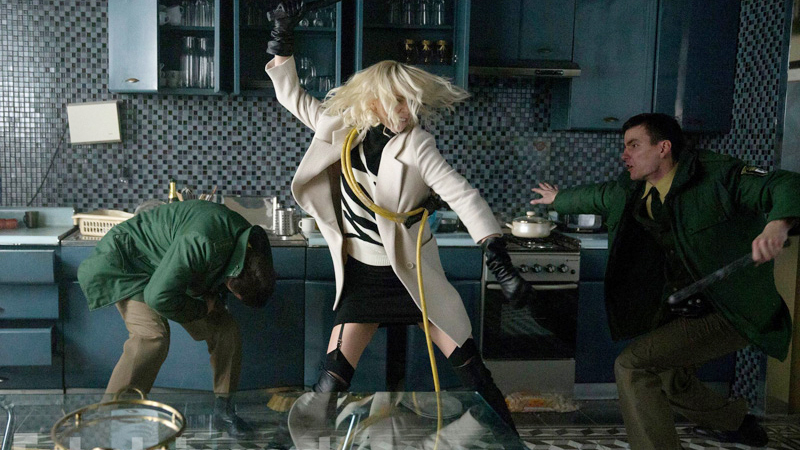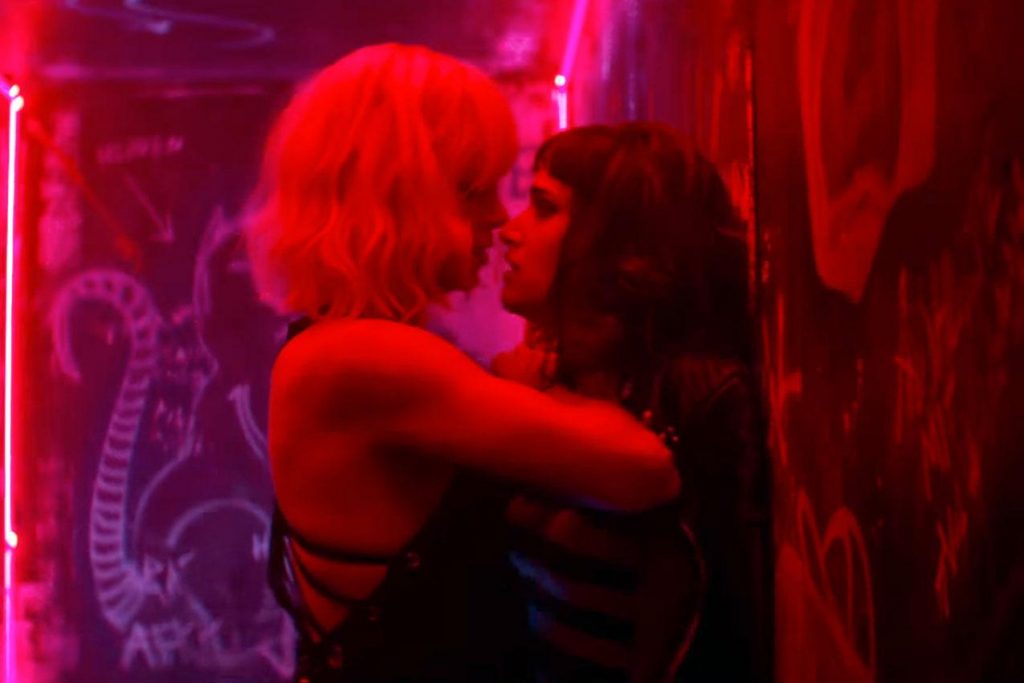
Atomic Blonde starts in Berlin, days before the fall of its wall, with MI-6 agent James Gasciogne (Sam Hargrave) being hunted down and executed by KGB agent Yuri Bakhtin (Jóhannes Haukur Jóhannesson). Gasciogne, admitting defeat under the barrel of Bakhtin’s gun, remarks that he always thought he’d be killed by the best as opposed to some random Russian mook. Oddly enough, so did I.
Atomic Blonde, after all, comes to us from David Leitch, former stuntman and one key quarter of the team (alongside Chad Stahelski, Derek Kolstad, and Keanu Reeves) that brought John Wick to vibrant, headshot-happy life. Between the pedigree and the ads making use of pull quotes such as “Nobody kicks ass like Charlize [Theron],” emphasizing the raucous violence of the film, certain expectations are formed. Bakhtin, you would assume, is the film’s chief antagonist, or at least the Clarence Boddicker to someone’s Dick Jones, and that most of the film would be spent on Theron’s Lorraine Broughton killing her way to him—not just to avenge her dead lover, but to retrieve the list of active field agents in the Soviet Union that Bakhtin took off Gasciogne’s body, concealed in a wristwatch. Assisted by David Percival (James McAvoy), a highly-regarded fellow MI-6 agent who might have gotten a little too comfortable in his post, and Delphine Lasalle (a surprisingly charming Sofia Boutella), a naïve French operative that Broughton takes a shine to, everything’s in place for a straightforward, badass actioner. There’s even room for a slick third-act twist, set up by Broughton’s secondary objective to assassinate a double agent going by the codename “Satchel,” whose identity is revealed by the list.
As we soon realize, however, it’s not that simple; Berlin in ’89, as portrayed in the film, wasn’t that simple. In this world, you can’t pick the moral allegiances of your friends any more than you can pick the caliber of man who ultimately kills you. Black and white keep bleeding into each other until even the color grey somehow loses all meaning, and the only rule that keeps your head straight is to stay alive first, look out for your friends second.

That, or Kurt Johnstad’s (300) script is just way too complicated. This is the kind of film you’ll spend two hours watching and possibly another four going back over the major twists to see if you can keep the character motivations straight, before coming to the conclusion that you need a second viewing to figure it out. Maybe it does all make sense. But the movie, while never unfair, is also lurid and mean as hell, and whether or not you want to give it that rewatch is going to hang on your tolerance for that.
Just so we’re clear, however, any reservations I have about the movie have little to do with Leitch’s visual work, echoing Walter Hill in his prime. Working with his John Wick DP Jonathan Sela and Germany-based production designer David Scheunemann (previously an art director for Cloud Atlas and Inglourious Basterds), Leitch presents Berlin at the end of the Cold War as grimy and electric, where death and intrigue go hand in hand with hard partying and loud music.* The setting is a perfect match for this morally murky, take-no-prisoners kind of spy thriller.
(*Speaking of which, the soundtrack is outstanding, complementing the atmosphere of the film beautifully, never merely sitting on top of it. Lots of standards, not all of them obvious, with a few deep cuts thrown in. But any movie that can drop the played-out “Under Pressure” by Bowie and Queen over a crucial scene and have it feel perfect is a movie that knows what the fuck it’s doing.)
How’s the action? It’s as phenomenal as advertised, but it’s a very different kind of action than seen in John Wick. When we first meet Lorraine Broughton, it’s after her return from Berlin; the story is primarily framed around a debriefing with her bosses (Toby Jones and James Faulkner) and an interested party from the CIA (John Goodman). She’s taking an ice bath, and we see her body covered in all sorts of cuts and bruises. The woman has been through hell, and the fight choreography reflects that. The much-hyped single-take action scene serving as the movie’s centerpiece is light on “gun-fu” and heavy on an increasingly exhausted Broughton fighting off all comers to protect a compromised asset escaping into West Berlin. Far from being mere flash, the sequence highlights Broughton’s increasing desperation—near the beginning of the second act we saw her take on a room full of cops like it was nothing—and dedication to her mission. And it’s a perfect setup for the kick in the dick that comes when The Wall falls about two scenes later.

The movie builds itself on these big, brutal action scenes, but it’s held together on such small, ironic indignities, spurred on by parties that are just trying to survive by their own separate sets of rules. If it isn’t great, by deficiency of not seeming to hang together at first glance, it’s at least interesting, and I can get behind the intent. Either way, it’s not quite conducive to the sort of romp I expected when I was seated for this movie in a big RPX theater designed to overload your senses.
Again, it’s possible that a second viewing could help alleviate any confusion I have, especially with the benefit of proper expectations. But as I also said, it’s the kind of cold-blooded, brutal motherfucker of a movie that I admire more than I adore. While I wouldn’t call Atomic Blonde a tragedy, passion and ideals are liabilities in its world. It’s perfectly honest and, again, admirable, but it’s unfortunately not something I often find myself coming back for more of.
Like the characters in its volatile setting, it’s hard for me to characterize Atomic Blonde as simply good or bad. I have trouble even calling it mediocre. The action, the direction, the performances, it all comes together in a banging package that would leave me hooting and hollering if only I didn’t have to worry too much about what the hell was going on. In the end, the antagonist of the piece monologues to Broughton about the motivations behind his actions, coming to the conclusion that “I fucking love Berlin!” If only it were that simple for me.

